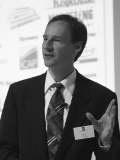GOTO is a vendor independent international software development conference with more that 90 top speaker and 1300 attendees. The conference cover topics such as .Net, Java, Open Source, Agile, Architecture and Design, Web, Cloud, New Languages and Processes
Mark Madsen, TweetThirdnature

Biography: Mark Madsen
Mark designs and builds analysis and decision support systems, and the data management and infrastructure behind them. His research focus is on emerging technology and practices in analytics, information management, and user experience for data access & delivery applications. He speaks at conferences internationally on anything related to data.
Mark focuses on two types of work: using data to make decisions and manage organizations, and building the technology infrastructure to support it. A big part of making decisions and using data in a corporate setting is ensuring that the right data capture and data delivery infrastructure is in place to manage the business. As a result, the work is as much information strategy and IT architecture as it is performance management and decision support.
Presentation: TweetBig Data, Bad Analogies
Data lakes, data exhaust, web scale, data is the new oil. Vendors are throwing new terms and analogies at us to convince us to buy their products as the market around data technologies grows. We change data persistence and transaction layers because "databases don't scale" or because data is "unstructured". If data had no structure then it wouldn't be data, it would be noise. Schema on read, schema on write, schemaless databases; they imply structure underlying the data. All data has schema, but that word may not mean what you think it means.
This presentation will describe concepts of data storage and retrieval from technology prehistory (i.e. before the 1980s) and examine the design principles behind both old and new technology for managing data because sometimes post-relational is actually pre-relational. It is important to separate what is identical to things that were tried in the past from new twists on old topics that deliver new capabilities.
Directly related to these topics are performance, scalability and the realities of what organizations do with data over time. All of these topics should guide architecture decisions to avoid the trap of creating technical debts that must be paid later, after systems are in place and change is difficult.
